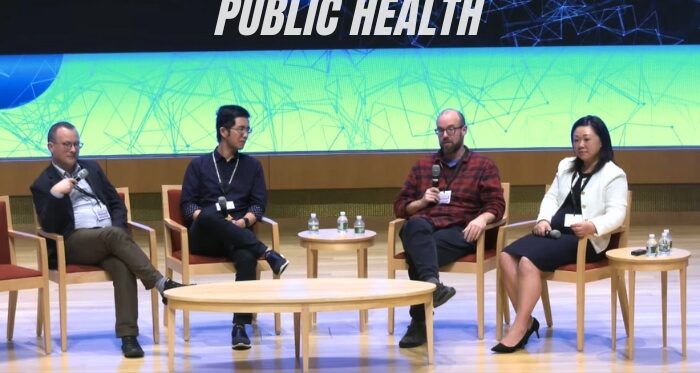Staying updated on the latest public health advancements is crucial in today’s digital age for professionals and enthusiasts alike. As many of us know, attending conferences can be one of the most effective ways to gain insights, share knowledge, and network with like-minded individuals.
But how do you find upcoming public health conferences?
Well, it’s easier than you might think; websites like globalconference.ca have emerged as valuable resources, centralizing information on a multitude of events across the world.
With a few clicks and the right search strategies, you can discover a range of conferences tailored to your interests, ensuring you’re always at the forefront of public health discussions. Join us as we delve deeper into this topic in the sections ahead.
Public Health Conferences- A Quick Overview
Public health is a vast and multidimensional field intricately connected to societal well-being, policy-making, and global cooperation. As the world faces new health challenges, from pandemics to chronic illnesses, staying updated becomes not just beneficial but crucial. Conferences offer an avenue to keep pace with these dynamic shifts, presenting research findings, introducing innovative solutions, and fostering global collaboration.

At these events, delegates range from world-renowned experts to early-career professionals, all bringing unique perspectives and insights. Public health conferences serve as a melting pot of ideas where interdisciplinary approaches are discussed and groundbreaking strategies are unveiled. By attending, one ensures they remain at the forefront of health advancements and is better equipped to make impactful decisions and contributions.
Key Purpose of the Public Health Conference
Public health conferences are more than just formal gatherings; they are catalysts for change, platforms for innovation, and hubs for networking. They serve to advance our collective understanding of health challenges and devise collaborative solutions. By dissecting the core purposes, we uncover the real impact of these events.
Knowledge Dissemination
Research and findings in public health constantly evolve. Conferences ensure the latest breakthroughs are shared widely. This promotes evidence-based decision-making across the sector.
Networking Opportunities
Such events bring together a diverse group of professionals. Building relationships at these conferences can lead to collaborative projects. Networking helps in harnessing collective wisdom and expertise.
Skill Enhancement
Workshops and sessions offer hands-on experiences. Attendees can refine existing skills or acquire new competencies. These enhancements directly benefit their respective communities and organizations.
Policy Formation and Advocacy
By discussing pressing health challenges, conferences influence policy direction. Stakeholders get a platform to voice concerns and suggest improvements. This advocacy shapes better, more informed public health policies.
Global Collaboration
Public health issues often transcend borders. Conferences foster a sense of global unity and shared purpose. They promote cross-border collaborations, ensuring comprehensive solutions to global challenges.
The significance of public health conferences goes beyond mere academic exchanges. They act as converging points for expertise, driving both individual growth and collective advancements in the realm of health. By understanding their multifaceted purposes, we can better appreciate their contribution to global well-being.
How Do You Find Upcoming Public Health Conferences?
Finding upcoming public health conferences is essential for professionals who wish to stay updated, network, and enhance their skills. Here’s a step-by-step guide to help you discover these valuable events:
Step-1. Professional Organizations and Associations
Most public health professionals are members of certain organizations, like the Global Conference on Public Health and Epidemiology Science (GCPHE), the World Health Organization (WHO), the American Public Health Association (APHA), or their local public health organizations. These bodies often organize conferences or can provide details about upcoming events.
Step-2. Academic Institutions
Many universities and research institutions with public health programs host annual or bi-annual conferences. Regularly checking their websites or subscribing to their newsletters can provide information on upcoming events.
Step-3. Dedicated Conference Websites
There are websites, like globalconference.ca, Conference Alerts, and All Conference Alert, dedicated to listing conferences from various fields, including public health. Simply inputting “public health” into their search bars can yield a list of upcoming conferences.
Step-4. Industry Publications and Journals
Public health journals or magazines often advertise or report on upcoming conferences. By subscribing or periodically reviewing these publications, you can stay informed about future events.
Step-5. Networking
Engaging with fellow professionals, either in person or on platforms like LinkedIn, can be a great way to hear about upcoming conferences. People often share events they’re attending or speaking at, providing you with leads.
Step-6. Online Communities and Forums
There are several online forums, discussion boards, and communities dedicated to public health. Members often post about conferences, seminars, and workshops. Websites like ResearchGate or platforms such as Reddit might have specific threads or groups focused on public health topics.
Step-7. Alerts and Subscriptions
Setting up Google alerts for terms like “public health conferences 2023” can provide timely updates. Similarly, subscribing to newsletters from key public health entities will ensure you receive direct notifications about their events.
Step-8. Local Health Departments
Your regional or local health department might be aware of smaller, local conferences or workshops that might be of interest.
Remember, while discovering conferences is the first step, ensure you also vet the event’s relevance, the speakers’ credibility, and its alignment with your professional goals. This will ensure that you invest your time and resources in events that genuinely benefit your growth in the public health domain.
Popular Types of Public Health Conferences
Public health conferences span a variety of themes, each tailored to address specific challenges and aspects of the vast domain. These events offer platforms for dialogue, collaboration, and innovation. Delving into the types, we uncover the diverse nature of public health gatherings.
Epidemiology Gatherings
Epidemiology conferences focus on the spread and control of diseases. These events often dissect recent outbreaks, offering solutions and preparedness strategies. Insights here can shape the global response to health crises.
Health Policy Forums
Such forums center around health governance and legislation. Stakeholders discuss, critique, and propose policy modifications. They aim to ensure policies align with current health needs.
Environmental Health Summits
Environmental factors greatly influence public health. These summits address pollution, sanitation, and other environmental concerns. Sustainable solutions to safeguard public health are the prime focus.
Global Health Conclaves
Addressing issues that transcend borders, these events promote international cooperation. From pandemics to malnutrition, a range of topics gets explored. The goal is to ensure holistic global well-being.
Health Education Symposiums
These revolve around promoting health literacy and behaviors. Educators, policymakers, and professionals brainstorm strategies to educate communities. Effective health education can drastically reduce disease prevalence.
In summation, public health conferences are tailored to address the multifaceted challenges of the health domain. By attending these specialized events, professionals can target their learning, network with like-minded individuals, and collaboratively forge a healthier future.
The Benefits of Attending a Public Health Conference
Attending a public health conference offers numerous advantages, both to individuals and the broader health community. These gatherings provide a unique platform for learning, networking, and advocacy. Here’s a look at some of the most significant benefits:
Knowledge Enhancement
At the heart of every conference lies the opportunity for knowledge acquisition. Public health conferences often showcase the latest research, technological advancements, and innovative strategies in disease control, prevention, and health promotion. By attending diverse sessions, professionals can get a comprehensive update on recent developments, helping them make informed decisions in their practice.
Networking Opportunities
Beyond formal presentations, conferences are melting pots of interdisciplinary professionals. They present a unique chance to connect with peers, renowned experts, and potential collaborators from various parts of the world. Such interactions can lead to future research collaborations, job opportunities, or even mentor-mentee relationships.
Skill Development
Apart from theoretical knowledge, many conferences offer hands-on workshops and training sessions. Whether it’s learning a new epidemiological tool, mastering public health software, or understanding community engagement techniques, attendees can bolster their skill set, ensuring they remain competent and relevant in their roles.
Exposure to Diverse Perspectives
Public health challenges vary across regions and communities. Conferences gather participants from different backgrounds, cultures, and experiences, offering a mosaic of perspectives on common health issues. Such diversity can lead to more holistic and inclusive solutions.
Opportunity to Present Research
For academics and researchers, these events are platforms to disseminate findings. By presenting, they receive feedback, engage in scholarly discussions, and enhance the visibility of their work. This can be invaluable for refining research methodologies or understanding the broader implications of their studies.
Advocacy and Policy Influence
With the presence of policymakers and influencers at such gatherings, there’s potential for real-world impact. Advocates can highlight pressing issues, propose changes, and engage in dialogues that might influence future public health strategies and policies.
Professional Growth
Being active in conference circles can elevate one’s professional stature. It’s a chance to gain recognition, stay abreast of industry trends, and even identify potential career advancements or shifts, all of which contribute to long-term professional growth.
Inspiration and Motivation
Hearing success stories, challenges overcome, and innovative solutions can reignite one’s passion for public health. Conferences serve as reminders of the collective mission and often leave attendees feeling inspired, motivated, and more connected to their purpose.
Public health conferences are more than just events; they’re hubs of learning, collaboration, and inspiration. The multifaceted benefits derived from them underscore their importance in the continuous evolution and betterment of the public health sector.
Final Considerations
Public health conferences stand as vital platforms in the realm of healthcare, fostering knowledge sharing, global collaboration, and professional growth. These events encapsulate the essence of collective wisdom, showcasing a convergence of expertise, research, and innovation.
For professionals and enthusiasts keen on staying up-to-date with the field’s dynamic shifts, the question arises: how do you find upcoming public health conferences? Leveraging dedicated websites, professional organizations, and digital networking tools is the answer.
In today’s digital age, being proactive in seeking these opportunities ensures one remains at the helm of public health advancements. Ultimately, attending these conferences not only enriches individual acumen but significantly contributes to the broader goal of global health betterment.







